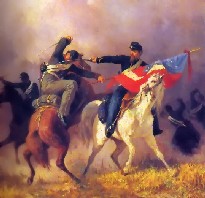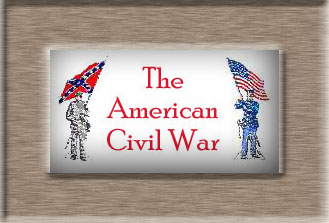


|

LINCOLN as a WRITER I differ with some of my Southern friends in that I see Abraham Lincoln as a literary genius, one of the great American prose stylists and certainly the greatest ever to occupy the Presidency. He could have written a Greek tragedy. Instead, he starred in one; and his abilities as a writer were accessories to his acts in office. They also gave his hagiographers ample material from which to build the myth of the patient, tolerant, humble Lincoln. That man is Lincoln's great fictional triumph; a character as enduring as Huck Finn and about as authentic. Herndon is the antidote, the man who knew him like a brother and described the struggles for self-control, the ambition, the intellectual arrogance, the bouts of rage and depression. The Lincoln worshippers in the History Departments were embarrassed by Herndon and tried to bury him in footnotes. Those lulled by the music of Lincoln's words tend to miss the facts and the deeds. Perhaps it's not a coincidence that my deaf fiancee, who has no ear for the music of Lincoln's prose, finds him despicable. All the better to see the rocks that his siren words disguised. Sometimes, he can make me laugh out loud. Lincoln, in a letter from his youth, describes meeting the girl he had agreed to court in Illinois: "I knew she was over-size, but she now appeared a fair match for Falstaff; I knew she was called an 'old maid,' and I felt no doubt of the truth of at least half of the appelation." You have to take a second to unravel that "half of the appelation" to get the joke, and it's a mean one. That's typical of him, though. I don't know if it's true, as some say, that Lincoln never lies; but you have to read him very carefully. When in the congressional election of 1846 he was accused (more or less correctly) of being an infidel, he replied that he could never support "a man for office, whom I knew to be an open enemy of, and scoffer at, religion." The key word, of course, is "open." But the letter had the desired effect, and the Protestant objection died down. Just so, during the Mexican War, in 1848, he had eloquently staked out the moral high ground for rebellion: "Any people anywhere, being inclined and having the power, have the right to rise up, and shake off the existing government, and form a new one that suits them better." If Lincoln had been asked to explain these words in 1862, Gore Vidal pointed out, "Lawyer Lincoln would probably have said, rather bleakly, that the key phrase here was 'and having the power.' " "Macbeth" was his favorite play. That's ominous. In his Springfield Lyceum speech of 1838 -- one of the key documents to understanding Lincoln's character -- he tells how an ambitious man, under the guise of fighting slavery, might re-order a republican nation in his own image. That speech is available online, so I'm not going to take up space with it here. But there's another document that is not to be found among the reams of Lincoln material posted on the Web. And to me, it's one of the most crucial: the letter he wrote in June 1863 to Erastus Corning and others in New York state who had petitioned against Lincoln's trampling of civil liberties in the name of war for the Union. He took the petition as an opportunity to reply with a public letter explaining his view of these things. And, to me, it's repressive and paranoid. Makes me think of Terrill, the Red Legs captain, in "Outlaw Josie Wales." "...[A]rrests are made, not so much for what has been done, as for what probably would be done. ... The man who stands by and says nothing when the peril of his Government is discussed, cannot be misunderstood. If not hindered, he is sure to help the enemy; much more, if he talks ambiguously -- talks for his country with 'buts' and 'ifs' and 'ands.' " Ye gods! It's not only the active traitors who should be arrested, in other words, but anyone who fails to cheer loud enough at the government pep rally. Because that's a sure sign of a traitor waiting to happen. You were either with him all the way, or against him. To simply decry the war effort was enough to brand you a traitor: "... [H]e who dissuades one man from volunteering, or induces one soldier to desert, weakens the Union cause as much as he who kills a Union soldier in battle. Yet this dissuasion or inducement may be so conducted as to be no defined crime of which any civil court would take cognizance." I've just been reading of the trial of Aaron Burr, where it was a serious legal question whether a man could be convicted of "treason" until he had actually physically made war on the government of the United States. Lincoln would extend that definition, in the face of centuries of law and custom and constitutional safeguard, into the very thoughts and words of his citizens. Now, here's the paranoia:
"The insurrectionists had been preparing for it more than thirty years, while the Government had taken no steps to resist them. The formerly had carefully considered all the means which could be turned to their account. It undoubtedly was a well-pondered reliance with them that, in their own unrestricted efforts to destroy Union, Constitution, and law, all together, the Government would, in great degree, be restrained by the same Constitution and law from arresting their progress. Their sympathizers pervaded all departments of the Government and nearly all communities of the people." I'm unaware of any active, continuous conspiracy that began in 1830 and drove onward with a single-minded purpose to Fort Sumter. But Lincoln seems to believe in one. And any public objection to the government stripping away basic rights from tens of thousands of people? That, too, is the work of the supple tools of the traitors, the wolves among the herds, the fifth column:
"From this material, under cover of 'liberty of speech,' 'liberty of the press,' and 'habeas corpus,' they hoped to keep on foot among us a most efficient corps of spies, informers, suppliers, and aiders and abettors of their cause in a thousand ways. They knew that in times such as they were inaugurating, by the Constitution itself, the 'habeas corpus' might be suspended; but they also knew they had friends who would make a question as to who was to suspend it; meanwhile, their spies and others might remain at large to help their cause. Or, if, as has happened, the Executive should suspend the writ, without ruinous waste of time, instances of arresting innocent persons might occur, as are always likely to occur in such cases; and then a clamour could be raised in regard to this, which might be, at least, of some service to the insurgent cause. Read it like Lincoln has to be read -- with an eye to the key phrase, which likely will be a subtle one: "... strong measures which by degrees I had been forced to regard as being within the exceptions of the Constitution ..." If you want an image of what he would have done had he, not Buchanan, been in power during the secession winter, he spells it out for you:
"Of how little value the constitutional provisions I have quoted will be rendered, if arrests shall never be made until defined crimes shall have been committed, may be illustrated by a few notable examples. Gen. John C. Breckenridge, Gen. Robert E. Lee, Gen. Joseph E. Johnston, Gen. John B. Magruder, Gen. William B. Preston, Gen. Simon B. Buckner, and Commodore Franklin Buchanan, now occupying the very highest places in the Rebel war service, were all within the power of the Government since the Rebellion began, and were nearly as well known to be traitors then as now. That time has not yet come. Unless, perhaps, it has arrived in the private ruminations of a John Ashcroft or a Richard Nixon.* * In light of what has since transpired, this was unfair to Ashcroft.
|
| �2002Douglas Harper | "When misunderstanding serves others as an advantage, one is helpless to make oneself understood." -Lionel Trilling |